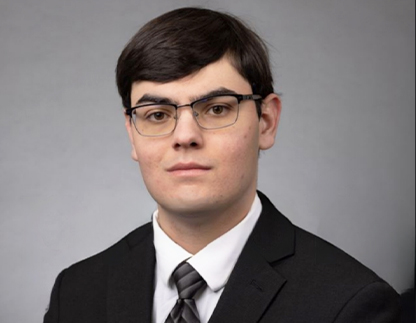What I’m most proud of isn’t a specific project or research achievement—it’s the people I’ve had the chance to aid along their own paths.”
Alexander Davis
PhD Candidate in Chemical and Biological Engineering

Alexander Davis is a PhD candidate in the Department of Chemical & Biological Engineering in the McCormick School of Engineering. He is a member of the Swearer Group, where his research focuses on utilizing plasmas to convert waste gases like carbon dioxide into useful materials to help reduce greenhouse gas emissions. Alexander is also the recipient of the International Institute for Nanotechnology (IIN) Ryan Fellowship.
How would you describe your research and/or work to a non-academic audience?
In Professor Dayne Swearer’s group, I work on finding ways to turn waste gases like carbon dioxide (CO₂) back into useful materials instead of letting them contribute to climate change. Specifically, I study how plasmas—an energized state of matter found in things as simple as neon signs and lightning—can help break apart CO₂ molecules and convert them into carbon monoxide (CO), which is a key feedstock in industrial processes. By optimizing reactor designs and integrating catalysts, I aim to make this process more energy-efficient and practical for large-scale use, ultimately helping to reduce greenhouse gas emissions in an electrified fashion.
What have been some of the most memorable twists and turns of your career?
My career path has been anything but linear, but that’s what has made it so exciting. I started in heterogeneous catalysis, then shifted to homogeneous catalysis, and now I’m exploring the emerging field of plasma catalysis. Before I even knew it, I had done research across four different universities. While the goal of my research experiences has always been the same—developing energy-efficient ways to produce essential chemicals—the approaches have varied dramatically. Each transition felt like stepping into a whole new world, full of challenges and opportunities to learn. I still remember that first moment of realizing just how much I didn’t know, but that’s exactly what keeps me so motivated about my work—how much there is still left to learn.
Tell us what inspired your research and/or work.
The Swearer Lab explores a wide range of applications for plasma chemistry, from nanomaterial synthesis to selective gas-phase reactions. Plasma catalysis, in particular, is still a young field with many open questions, which is what makes it so exciting. What drew me in was the challenge of figuring out whether the current limitations come from the underlying chemistry or from the way we design reactors. I’ve always loved building and tinkering—whether it was for research projects or design competitions—so the idea of pushing plasma chemistry forward through innovative reactor design is what inspires my work today.
Why Northwestern?
I chose Northwestern not just for its world-class research and top-tier facilities, but for the sense of community that sets it apart. From the moment I first stepped onto campus, I felt genuinely welcomed, and that feeling has only grown stronger. Whether it’s my cohort, my lab group, or the broader chemical engineering department, I’ve found an environment where people are not only passionate about their work but also supportive of one another. That combination of cutting-edge research and a tight-knit, collaborative culture made Northwestern the perfect place for me.
What advice would you give your younger self or someone considering a similar path?
I would tell my younger self—and anyone considering a similar path—that both the research experiences you love and the ones you don’t are equally valuable. Early on, it’s impossible to know exactly what will excite you, so take every opportunity to explore different areas. As you face challenges or find your project shifting in unexpected directions, focus on what excites you most and use that to guide your next steps. Science is rarely confined to a single path, so stay open to new directions while staying true to what genuinely interests you.
Tell us about a current achievement or something you're working on that excites you.
One of the most exciting things I’ve worked on so far in the Swearer Group has been designing and building two small plasma reactors to expand the kinds of experiments we can run. Seeing them come to life and thinking about how I can improve their designs in future iterations has been incredibly rewarding. This hands-on process of designing, building, and testing is exactly what I hoped to get out of my PhD, and I feel lucky that I get to spend my time tackling these challenges and pushing the research forward.
What are you most proud of in your career to date?
What I’m most proud of isn’t a specific project or research achievement—it’s the people I’ve had the chance to aid along their own paths. Whether it’s working as a teaching assistant, tutoring, or helping others get started in research or on design teams, I’ve loved supporting others the same way so many incredible mentors supported me. Seeing students and peers go on to do amazing things, whether in my field or beyond, and hearing about their successes is incredibly rewarding. Knowing that I played even a small role in their journey is something that brings me a lot of joy.
Publish Date: April 29, 2025
If you know a graduate student, postdoctoral scholar, graduate faculty member, staff member, or a member of our TGS alumni population who would make a great candidate for our TGS Spotlight Series, please complete this brief TGS Spotlight Series Nomination Form.